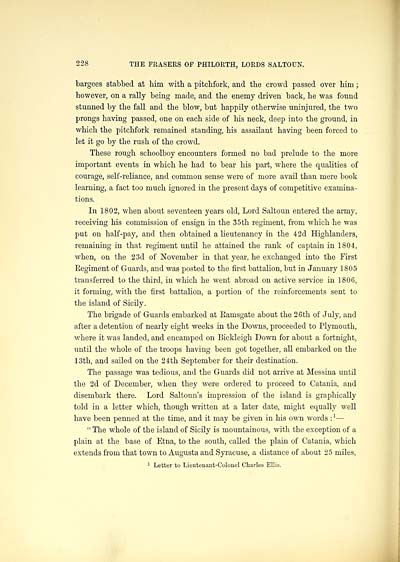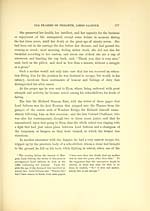Frasers of Philorth > Volume 1
(298)
Download files
Complete book:
Individual page:
Thumbnail gallery: Grid view | List view

228 THE FRASEE.S OF PHILORTH, LORDS SALTOUN.
bargees stabbed at him with a pitchfork, and the crowd passed over him ;
however, on a rally being made, and the enemy driven back, he was found
stunned by the fall and the blow, but happily otherwise uninjured, the two
prongs having passed, one on each side of his neck, deep into the ground, in
which the pitchfork remained standing, his assailant having been forced to
let it go by the rush of the crowd.
These rough schoolboy encounters formed no bad prelude to the more
important events in which he had to bear his part, where the qualities of
courage, self-reliance, and common sense were of more avail than mere book
learning, a fact too much ignored in the present days of competitive examina-
tions.
In 1802, when about seventeen years old, Lord Saltoun entered the army,
receiving his commission of ensign in the 35th regiment, from which he was
put on half-pay, and then obtained a lieutenancy in the 42d Highlanders,
remaining in that regiment until he attained the rank of captain in 1804,
when, on the 23d of November in that year, he exchanged into the First
Eegiment of Guards, and was posted to the first battalion, but in January 1805
transferred to the third, in which he went abroad on active service in 1806,
it forming, with the first battalion, a portion of the reinforcements sent to
the island of Sicily.
The brigade of Guards embarked at Eamsgate about the 26th of July, and
after a detention of nearly eight weeks in the Downs, proceeded to Plymouth,
where it was landed, and encamped on Bickleigh Down for about a fortnight,
until the whole of the troops having been got together, all embarked on the
13th, and sailed on the 24th September for their destination.
The passage was tedious, and the Guards did not arrive at Messina until
the 2d of December, when they were ordered to proceed to Catania, and
disembark there. Lord Saltoun's impression of the island is graphically
told in a letter which, though written at a later date, might ecpially well
have been penned at the time, and it may be given in his own words : 1 —
" The whole of the island of Sicily is mountainous, with the exception of a
plain at the base of Etna, to the south, called the plain of Catania, which
extends from that town to Augusta and Syracuse, a distance of about 25 miles,
1 Letter to Lieutenant-Colonel Charles Ellis.
bargees stabbed at him with a pitchfork, and the crowd passed over him ;
however, on a rally being made, and the enemy driven back, he was found
stunned by the fall and the blow, but happily otherwise uninjured, the two
prongs having passed, one on each side of his neck, deep into the ground, in
which the pitchfork remained standing, his assailant having been forced to
let it go by the rush of the crowd.
These rough schoolboy encounters formed no bad prelude to the more
important events in which he had to bear his part, where the qualities of
courage, self-reliance, and common sense were of more avail than mere book
learning, a fact too much ignored in the present days of competitive examina-
tions.
In 1802, when about seventeen years old, Lord Saltoun entered the army,
receiving his commission of ensign in the 35th regiment, from which he was
put on half-pay, and then obtained a lieutenancy in the 42d Highlanders,
remaining in that regiment until he attained the rank of captain in 1804,
when, on the 23d of November in that year, he exchanged into the First
Eegiment of Guards, and was posted to the first battalion, but in January 1805
transferred to the third, in which he went abroad on active service in 1806,
it forming, with the first battalion, a portion of the reinforcements sent to
the island of Sicily.
The brigade of Guards embarked at Eamsgate about the 26th of July, and
after a detention of nearly eight weeks in the Downs, proceeded to Plymouth,
where it was landed, and encamped on Bickleigh Down for about a fortnight,
until the whole of the troops having been got together, all embarked on the
13th, and sailed on the 24th September for their destination.
The passage was tedious, and the Guards did not arrive at Messina until
the 2d of December, when they were ordered to proceed to Catania, and
disembark there. Lord Saltoun's impression of the island is graphically
told in a letter which, though written at a later date, might ecpially well
have been penned at the time, and it may be given in his own words : 1 —
" The whole of the island of Sicily is mountainous, with the exception of a
plain at the base of Etna, to the south, called the plain of Catania, which
extends from that town to Augusta and Syracuse, a distance of about 25 miles,
1 Letter to Lieutenant-Colonel Charles Ellis.
Set display mode to:
![]() Universal Viewer |
Universal Viewer | ![]() Mirador |
Large image | Transcription
Mirador |
Large image | Transcription
Images and transcriptions on this page, including medium image downloads, may be used under the Creative Commons Attribution 4.0 International Licence unless otherwise stated. ![]()
| Histories of Scottish families > Frasers of Philorth > Volume 1 > (298) |
|---|
| Permanent URL | https://digital.nls.uk/96569076 |
|---|
| Attribution and copyright: |
|
|---|
| Description | A selection of almost 400 printed items relating to the history of Scottish families, mostly dating from the 19th and early 20th centuries. Includes memoirs, genealogies and clan histories, with a few produced by emigrant families. The earliest family history goes back to AD 916. |
|---|

